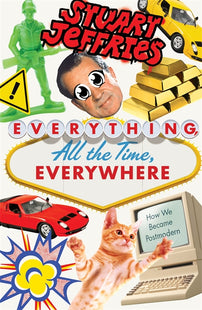Everything, All the Time, Everywhere: a Letter from the Editor
"Post modernity ‘originated under the star of’ neoliberalism and should be seen as much a system of market discipline as a philosophical set of ideas expressed through cultural forms. It is both the alibi and indictment for neoliberalism, but is too ironic, too cool to call itself out." –Leo Hollis, editor

It is hard to forget Stuart Jeffries’ face when we began to discuss the possibilities of a history of Postmodernism. He has just triumphantly published the group biography of the Frankfurt School, Grand Hotel Abyss, to astonishingly good critical reviews, and probably felt that he needed a break from such ambitious projects. That book had taken years, had crossed continents, included every major thinker from Benjamin and Adorno to Habermas and Angela Davis and included everything from Weimar opera, the rise of the Nazis, Hollywood and the uprisings of 1968. I was lucky that Stuart did not dismiss the idea immediately, but there is nothing he relishes more than an impossible intellectual task.
He asked a series of hesitant questions: How can we define post modernity? When did it start? How do we even attempt to be comprehensive when it can be seen in politics, culture, pop music, architecture, film, design, technology and the transformations of everyday life? We could not stop ourselves coming up with interesting examples that ‘had to be in the book’: Basquiat, Charles Jencks, David Bowie, Steve Jobs, Cindy Sherman, as well as Jean Baudrillard, Jean-Luc Lyotard, Frederic Jameson, Judith Butler, Deleuze and Guattari. Not forgetting the iPod, 9/11, Poundsbury, graffiti, Jeff Koon’s Rabbit, Las Vegas, the Big Bang. All we could agree on is that, if we don't know when it exactly started, we do know when it ended –or, rather, that it had never ended and we were still living in it. And that, as the list above shows, it seeped into every corner of our lives; that it touched every object, every moment of the day, in every place.
This is because, as Jeffries so brilliantly argues, post modernity ‘originated under the star of’ neoliberalism and should be seen as much a system of market discipline as a philosophical set of ideas expressed through cultural forms. It is both the alibi and indictment for neoliberalism, but is too ironic, too cool to call itself out. How – for example - does an artist such as Jenny Holzer, who began her career bill-stickering intellectual bombs such as ‘Protect me from what I want’ across New York streets, to, twenty years later, using the same truth as a slogan to decorate a BMW during the 24-hour Le Mans Rally?
To put it another way, Everything, All the Time, Everywhere is the riotous, essential cultural history of the last fifty years that you did not know you needed. Over ten chapters, Jeffries selects a year and then three things that happened. So it starts in 1972 with Nixon’s shock doctrine, Martha Rosler’s Bowery photographs and the English publication of Delueze and Guattari’s Anti Oedipus. 1983 collapses the experience of the flaneuse/stalker Sophie Calle, the ‘Hello World’ moment of the first Apple Mac II, and Madonna’s majestic arrival on the cultural scene with her first album and “Desperately Seeking Susan’. 1997 tries to make sense of the juxtaposition of Chris Kraus’s autofiction I Love Dick, the launch of Netflix and the release of the first ‘Grand Theft Auto’.
By bringing these ideas, object and moments together Jeffries shows the pervasive, serpentine means of how everyday life becomes infused with new meaning and values. How it produces new forms of art, new ways of communicating and making profit. And how, in age of information technology, all that was once solid and you could hold in your hand, is turned into the intangible. In the Age of NFTs, it is a brutal reminder that we have learned the price of every thing, that it is happening 24/7 and that it has filled every corner and crack of our lives.
Jeffries’ book gives us the urgent history of how this happened. It is perhaps even more ambitious than we originally planned, and certainly more than Grand Hotel Abyss. But that is perhaps because this is something that is happening now. In the final section of the book Stuart takes a walk from his house in north London and visits a 1970s social housing block, that was designed in the then ‘radical’ PoMo style. This was one of the last council housing projects in the city. He asks himself is there something about the style of the architecture and the politics that surround social housing that signalled that this was the end of a way of thinking about caring society, rather than a beginning. If so, when, and how, will this end?
–Leo Hollis, editor
Everything, All the Time, Everywhere is one of our Verso Book Club selections in October. See more here!
